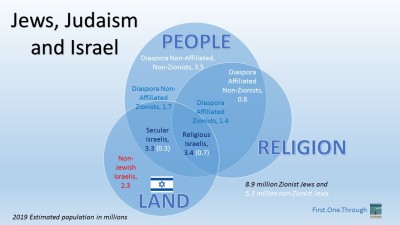There are many debates being waged around the world about whether anti-Zionism is anti-Semitism, how it is possible that some Jews may be against Israel, and why some Jews who do not believe in either God or religion are still considered Jews. This article will not tackle all of those issues but will seek to define, segment and size the nature of Jews, Judaism and Israel to better frame discussions on those topics.
Judaism
Judaism is a religion that takes the source of its teachings from the Five Books of Moses. Biblical scholars over thousands of years have interpreted the various events and commandments found in the Old Testament to frame how a Jewish person should act and live. The approaches changed over the millenia, with some sects like Sadducees, Essens and Karaites fading away while the Pharisees survived with the publication of the Talmud.
Over the last few hundred years, newer religious denominations came about including Conservative, Reform and Reconstructionist Judaism. Each adopted different approaches as to whether the Bible was written by God or was simply divinely-inspired, and how to translate the ancient stories into relevant lessons for today.
Jews
Jews are most often defined by their lineage. Abraham, the father of monotheism, is considered the first Jew in Judaism. His grandchild Jacob became known as Israel and Jacob’s sons were the basis for the twelve tribes and the nation of Israel. Jews consider themselves direct descendants of these biblical characters.
According to the Orthodox and Conservative streams of Judaism, a person’s religion is decided by matrilineal descent (the religion of the mother), while the Reform and Reconstructionist groups have a broader allowance, in that they include patrilineal descent as well. Converts are also welcomed as Jews (although they are not encouraged) and tradition maintains that the new Jews do not only take upon themselves the religion, but the ancestry of Jews as well. A convert’s new Hebrew name will be “______ son of Abraham” or “_____ daughter of Sarah” to show that they are now included as part of the heritage of Jewish peoplehood.
Israel
Judaism is a unique religion in that it has ties to a specific piece of land. The Bible clearly relays to Abraham, Isaac, Jacob and the descendants afterwards that the land of Canaan is their inheritance. The Bible describes specific commandments that can only be kept in Israel, and to this day, every Jew around the world prays facing the Temple Mount in Jerusalem, Israel.
Jews have always lived in the LAND of Israel. Indeed, they were the only religious group to move to the holy land throughout the 19th century and Jews have been a majority in the city of Jerusalem since the 1860’s, BEFORE the push for Jewish sovereignty and advent of Modern Zionism.
Jews, Judaism and Israel
Despite the intersection of Jews, Judaism and Israel, not every Jew follows the religion nor lives in Israel.
Religion and Zionism In Israel
There are roughly 14.2 million Jews alive in the world today. Of that total, roughly 6.7 million live in the Jewish State of Israel. There are another 2.3 million non-Jews that live in Israel, with a population that now exceed 9 million.
- Religious Jews 3.4 million
- Secular Jews 3.3 million
- Non-Jews 2.3 million
- Total 9.0 million people in Israel
The Pew Forum estimates that Haredi and Orthodox Jews account for 10% and 12% of Israeli Jews, respectively, with Conservatives and Secular Jews accounting for 28% and 49% of the Israeli Jewish population, respectively. Using a Venn diagram, one can plot the 3.3 million Secular Israelis as being Jews connected to the land of Israel (People + Land) but not to the Religion.
Among the religiously-affiliated Israeli Jews, the Haredi Jews are the least Zionistic, while most of the other streams are very passionate about Israel having Jewish sovereignty. The black hat/ Haredi community is less enamored with the Modern Jewish State as it is not based on Orthodox religious law and many believe that such a state should only come into being with the arrival of the Messiah.
| Denomination | Population% | Total | Zionist% | Total |
| Haredi | 10% | 0.7 | 10% | 0.1 |
| Orthodox | 12% | 0.8 | 100% | 0.8 |
| Conservative | 28% | 1.9 | 95% | 1.8 |
| Secular | 49% | 3.3 | 90% | 3.0 |
| Total in millions | 6.7 | 5.7 |
If one were to assume that only 10% of the Haredi population are Zionists and almost all of the other denominations are Zionists, roughly 1 million Jews in Israel today would not be considered ardent Zionists.
This is not an oxymoron, and goes to the nature of the confusion of different people’s opinions about Zionism. Many Jews living in Israel are against the GOVERNMENT, not the idea of Jews living in the land. Haredi Jews consider themselves anti-Zionist because they think a secular Jewish state has no legitimacy in the Jewish holy land. However, they believe very strongly that the land is the Jewish holy land and they have the right to live Israel. This is in sharp contrast to Muslim anti-Zionism around the world which believes both that the Israeli government should be destroyed and that Jews should be expelled from the land.
Diaspora Jewry on Israel and Judaism
A little more than half of world Jewry lives outside of Israel, roughly 7.5 million people. The vast majority of diaspora Jews live in the United States (over 5 million) with France, Canada and the United Kingdom accounting for over 1 million more.
The United States is a bit of an anomaly compared to Jews around the world, with strong Conservative and Reform movements. In much of the rest of the world, Jews are either Orthodox or secular. In considering the breakdown of Jews in the Venn diagram, assumptions are made for the 5.3 million Jews in the U.S. and then for the rest of the world.
| America | Population% | Total | Zionist % | Total |
| Orthodox | 10% | 0.5 | 50% | 0.3 |
| Conservative | 18% | 1.0 | 70% | 0.7 |
| Reform | 35% | 1.9 | 40% | 0.7 |
| Unaffiliated | 37% | 2.0 | 20% | 0.4 |
| Total in millions | 5.3 | 2.1 |
The Pew Forum estimated the breakdown of Jewish denominations in the United States and the percentages for people who consider themselves Zionists are educated guesses. The Conservative denomination is assumed to be the most pro-Israel, as the Orthodox group includes Anti-Zionist Haredi factions. Using these figures would suggest less than 40% of American Jewry is pro-Israel.
Different percentages are used in making estimates in the rest of the world, below:
| ROW | Population% | Total | Zionist % | Total |
| Orthodox | 25% | 0.6 | 60% | 0.3 |
| Conservative | 10% | 0.2 | 70% | 0.2 |
| Reform | 30% | 0.7 | 40% | 0.3 |
| Unaffiliated | 35% | 0.8 | 40% | 0.3 |
| Total in millions | 2.2 | 1.1 |
The figures for the 2.2 million Jews in the rest of the world are broad estimates. In some countries like France, 60% of the population is Sephardic which almost always considers itself Orthodox, even when not actively practicing Judaism. In general, the unaffiliated/ Reform account for a majority of the population.
Among the diaspora Jews outside of the U.S., Israel holds a more significant role as they suffer more discrimination and are much more likely to emigrate to the Jewish State. Using these figures – which are arguably low – approximately half of the Jews in the rest of the world would be considered active Zionists, 10% more than American Jewry.
Laying out these figures in the Venn diagram above shows that there are about 5.6 million affiliated Jews, of which roughly three-quarters are pro-Israel. This compares to approximately 8.5 million unaffiliated Jews of which only 45% are pro-Israel.
**This breakdown might be viewed by many as unfair. For example, according to Pew, 87% of American Reform Jews consider themselves only Jews through Peoplehood and not religion, while 50% of Unaffiliated Jews felt the same way. This would suggest 4.0 million Affiliated American Jews (both People and Religion) as opposed to the 1.5 million used in the chart above.**
However, the concept remains the same. There are Jews who consider themselves only Jews in the notion of peoplehood, those who consider themselves both Jews by peoplehood and religion, and further, those within each camp who consider themselves tied to Israel (whether they live there or not) and those who do not. The warring factions within the Jewish people of Zionist/anti-Zionist and Jewish anti-Semites often breakdown among these categories.
Jews, Judaism and Israel are all deeply connected yet are distinct at the same time. Before delving into the nuances related to antisemitism and anti-Zionism, it is important to understand the important interrelationship of land-government, people and religion while also acknowledging the varied preferences among Jews in how they define themselves and convey their passions.
Related First.One.Through articles:
For Liberals, It’s Israelis, Palestinians, and Indifference
Heritage, Property and Sovereignty in the Holy Land
The Non-Orthodox Jewish Denominations Fight Israel
Not Remembering, Forgetting and Never Knowing
From Promised Land to Promised Home
In Defense of Foundation Principles
An Orthodox Rabbi at the Capitol
Iran’s New Favorite Jewish Scholars
First.One.Through videos:
God is a Zionist (music by Joan Osborne)
The Green Line (music by The Kinks)
Judea and Samaria (music by Foo Fighters)
The Anthem of Israel is JERUSALEM
Subscribe YouTube channel: FirstOneThrough
Join Facebook group: FirstOne Through Israel Analysis




Pingback: Jews, Judaism and Israel | JewishToledo and JewishSegovia
Pingback: Jews, Judaism and Israel.
Pingback: Members of Knesset and the Jerusalem Program | FirstOneThrough
Pingback: American Jewry is Right on Israel | FirstOneThrough
Pingback: The Cultural Appropriation of the Jewish ‘Promised Land’ | FirstOneThrough
Pingback: For the Sins of 5780… | FirstOneThrough
Pingback: Jews Join Anti-Zionists in Rewriting History | FirstOneThrough
Pingback: Orthodox Institutions Should Rally To The Westchester Reform Temple | FirstOneThrough
Pingback: Today, Only Orthodox Jews Yearn For Prayers On The Temple Mount | FirstOneThrough
Pingback: An Open Letter To Israel’s Diaspora Minister | FirstOneThrough
Pingback: It’s Jewish: Kosher, Bris, Menorah, Mikvah, Land of Israel | FirstOneThrough